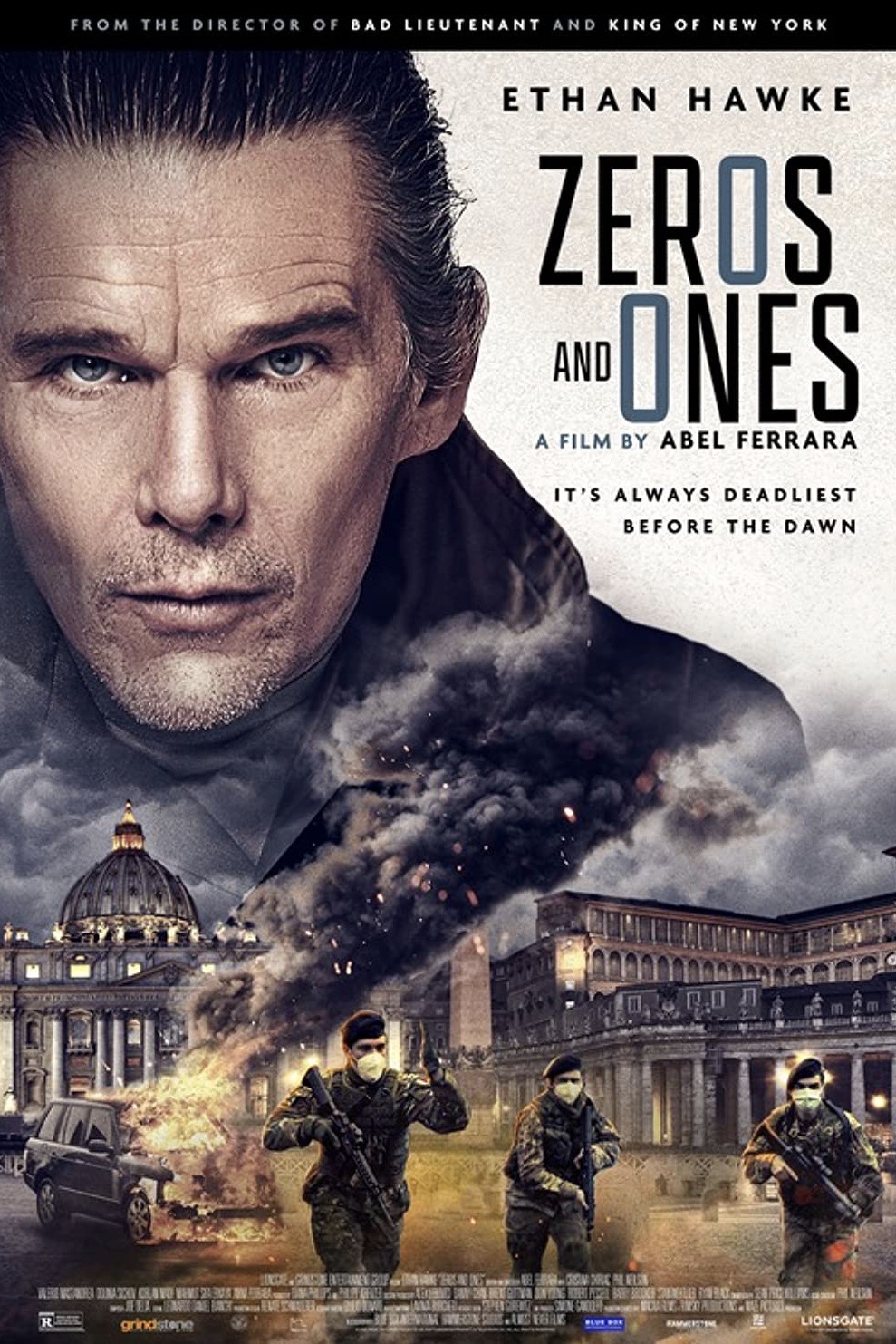After three consecutive features starring Willem Defoe, Abel Ferrara enlists Ethan Hawke for Zeros and Ones. The result is a confounding thriller, more an oddity than a standout in either’s filmographies. Nonetheless, the movie contains flashes of inspiration.
Synopsis
Admittedly, Zeros and Ones has a rather minimal narrative to grasp as a viewer. The movie is far less focused on plot than atmosphere, making the basic story components quite incoherent.
Here are the confirmable details: J.J. (Ethan Hawke) is an American soldier stationed in Rome. The Vatican has been bombed, and the city is in chaos. Everyone wears masks to guard against an undefined contagion. J.J. reaches the Vatican with a dual purpose: to investigate the explosion, and to search for his missing, unnamed, and revolutionary-minded twin brother (also Ethan Hawke). Over the course of a night, J.J. hunts across the Vatican for any information.
Ferrara as Writer-Director
Ferrara both wrote and directed Zeros and Ones. His screenplay is baffling in terms of narrative. J.J. sets out to track down various contacts, but his relationships to them and what purpose they serve in either of his quests is never quite explained. The result is a story pruned of access points for audience investment full of characters so vague they comingle into a featureless stream of story beats.
Has this worked before for Ferrara? Yes. His Siberia is an exceptional example of a more lyrical and experimental film without a defined plot. Yet, that film committed fully to the experience, while Zeros and Ones ends up drifting along in the liminal space between experimental and narrative cinema, giving us just enough information to wonder, but never enough to satisfy.
The script’s weaknesses are a shame because what Ferrara does excel at, alongside cinematographer Sean Price Williams, is visual flair. Through his camera, Rome transforms into a noir-adjacent hellscape. Empty alleys and paths splashed with shadow and rivulets of yellow and red light.
Ferrara favors fractured frames, showing only portions of a face, or corners of a room. When he pulls his camera back, such as when he fixes J.J. in the center of an abandoned street that dwarfs him, the film suggests a push and pull between intimate and public experiences. J.J. nearly disappears into these landscapes, a contrast to when he is central to the many close-ups during his meetings with various figures. The shame is that no amount of dynamic mise-en-scene can distract from how hollow the emotional and narrative stakes of the movie feel.
Ethan Hawke
Paired with Ferrara’s visual flair, it is Hawke’s dual-performance as J.J. and his twin that salvages Zeros and Ones from careening entirely into the realm of a lost cause. J.J. is a stone-faced military man who would likely vibe well with any of Liam Neeson’s various middle-aged action heroes.
Contrastingly, his twin is a bombastic extremist. Unfortunately, the twin only has one proper scene in the film, but it stands as one of the most engaging sequences. Hawke explodes, screaming scripture and lyrics from American folk songs at unidentified captors who have kidnapped him. It’s reminiscent of his recent standout work in The Good Lord Bird, both reminders that Hawke can erupt when necessary.
This is not to say that the rest of the movie bears out a poor performance. That is not the case at all. Even with the constant ambiguity of the stakes and plot, Hawke locates a stoic intensity that anchors J.J. from scene to scene. His eyes in particular suggest a man always calculating the odds and benefits of a given situation.
Hawke has always possessed a screen presence that demands attention, and so his take on J.J. turns that factor into audience curiosity. The unfortunate fact however is that due to the underlying script Hawke’s strengths cannot overcome poor material. He does the most with what he has, but there seems to be quite little here to work with.
Conclusion
In an alternate reality, where Ferrara’s screenplay better capitalized on the clear religious and moral undertones of examining twin brothers and a bombing at the Vatican, Zeros and Ones could have emerged as a fascinating complement to Paul Schrader’s exceptional First Reformed. Schrader’s film provides a remarkable script for Hawke to bite into. It also lets Schrader’s directorial style sing. But alas, the version of Zeros and Ones that ended up in the world is a forgettable entry in the careers of two otherwise towering talents.
More from Cinema Scholars:
NEEDLE IN A TIMESTACK: A Review Of John Ridley’s Sci-Fi Romance
THE MANOR (2021) – A Review Of The New Blumhouse Film
Keep up with Cinema Scholars on social media.
Like us on Facebook and follow us on Twitter and Instagram.
